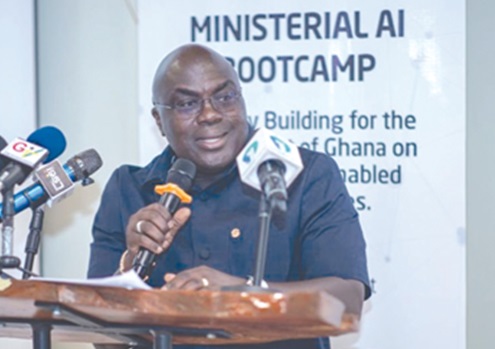
AI to contribute $20 billion to nation’s GDP by 2030 — Julius Debrah
Artificial Intelligence (AI) could add as much as $20 billion to the country’s Gross Domestic Product (GDP) by 2030, representing a 25 per cent boost to national economic output, the Chief of Staff, Julius Debrah, has revealed.
He said this was because a report by the United Nations Conference on Trade and Development (UNCTAD) had indicated that the global AI market was expected to grow 25-fold over the next decade — from $189 billion in 2023 to $4.8 trillion in 2033 — signalling the nation’s opportunity to leverage the technology for inclusive and sustainable development.
Mr Debrah made the projection last Friday, when he delivered the keynote address on behalf of President John Dramani Mahama at the opening of a three-day Ministerial AI Bootcamp at Adukrom in the Okere District Assembly in the Eastern Region.
“This represents a critical opportunity for Ghana to leverage AI to accelerate economic growth and address long-standing structural challenges. In this context, embracing AI is no longer an option.
It is essential. Countries that prioritise investment in AI research, digital infrastructure, education and ethical frameworks will be better positioned to thrive in this new global order,” he said.
The event, on the theme; “Building Capacity for the Government of Ghana on Advancing AI-Enabled Public Services”, was organised by the Ministry of Communication, Digital Technology and Innovations in collaboration with the United Nations Development Programme (UNDP) and the Cabinet Secretariat.
It brought together various ministers and focal persons with the overall objective of ensuring all ministers attain a standard level of understanding regarding the application of AI in executing their duties.
Benefits, KPIs
The Chief of Staff emphasised that AI’s responsible application could accelerate progress in health care, education, industry, innovation and governance, and called for deliberate investment in human capital as a cornerstone of Ghana’s national AI strategy.
Acknowledging a knowledge gap within the public sector—with over 70 per cent of civil servants lacking formal training in emerging technologies, Mr Debrah commended the ministry’s proactive efforts in developing a 10-year National AI Strategy (2025–2035), expected to position Ghana as a leader in inclusive AI adoption.
He urged ministers and heads of institutions to support their AI focal persons, with Julius Debrah warning that ministers who failled to support and implement the national AI strategy risked losing their jobs.
“The strategies and action plans that emerge from this workshop are expected to receive presidential endorsement and will be incorporated into each ministry's key performance indicators (KPIs).
What it means is that if you are a minister and you don't sit up, you probably could lose your job because you are not meeting the KPIs.
Take it seriously and think about it,” he said.
Significance
The Minister of Communication, Digital Technology and Innovations, Samuel Nartey George, described the bootcamp as a deliberate effort to build AI fluency among policymakers—not to make them coders but to equip them to govern wisely in an AI era.
He emphasised that the country must not be a bystander in the global AI evolution but an informed, strategic actor because it had already become a powerful force reshaping governance, national security, education and development.
He, therefore, outlined the fourfold purpose of the bootcamp - to demystify AI and clarify its relevance in governance; to explore global and regional trends and identify real-world use cases for each ministry; to address ethical and institutional challenges such as bias and data sovereignty, and to align leadership around the nation’s revised National AI Strategy.
“These efforts are anchored in Ghana's ambition to become the premier African AI hub by 2028.
Technologists and geeks alone cannot realise this vision. It requires committed institutional leadership who can think critically, govern boldly and act with strategic intent,” he said, urging leaders to actively engage, co-create solutions and help shape an inclusive AI-driven future.
